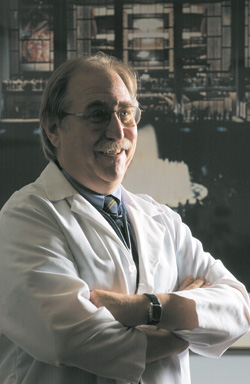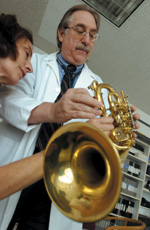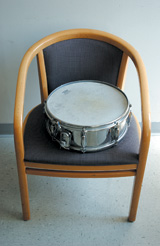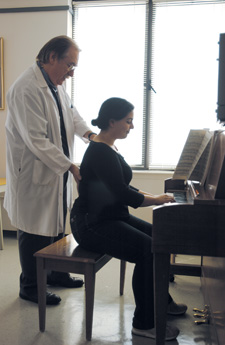 |
|
| Medical Muse
He angled his finger toward Placido Domingo’s eye. Suddenly Domingo blinked, causing an accidental poking. “I was sweating bullets,” says Mitchell Kahn, AB’71. The five-minute curtain call came and went. In an act of bravura, Kahn again took aim. This time the contact lens fell into place. Sans reading glasses, Domingo walked on stage. As the Metropolitan Opera’s house doctor in Frankfurt, Germany, that evening, Kahn handled medical emergencies big and small. He often does his best work behind the scenes. In his day job directing Manhattan’s Miller Health Care Institute for Performing Artists, he keeps thousands of singers, musicians, dancers, and actors fit to entertain. “You need to understand the life of a performer and what their issues are,” he explains, stroking his gray mustache. “What’s expected of them is so much at the edge of human capacity.” Kahn, who plays in a string quartet and has picked up piano, trombone, French horn, violin, and viola over the years, more than understands the life of a performer, a plus in a field requiring no specialized training beyond the M.D. Notwithstanding his musical talents, he prefers mending a real broken leg to breaking a figurative one. “I feel like I can’t get up there and do that, but I can participate in the creation, if not directly,” he says. “I don’t care about the applause.” Thanks to the size of his practice and its New York, New York, location, at 54 Kahn has become one of the nation’s leading physicians to the stars, delivering lectures on performing-arts injuries around the world. But the gig’s not all roses and champagne. “It’s a lot less glamorous than it sounds,” he says. “We do what general doctors do, [only] in this particular population.”
Take a typical day at the institute this past June. A bespectacled Kahn, in blue slacks, dress shirt, and striped tie, checks a minor heart problem, does a colonoscopy, inspects a finger cut, and offers advice in a broken condom’s aftermath. The main difference between his appointments and a generalist’s is that his patient list reads like a playbill. “The vast majority of the people we see,” he notes, “are the day-to-day professionals”—the chorus, orchestra, and supporting cast. “You have to treat them,” and the stars, “like ordinary patients and take a step back. If you don’t, you make mistakes.” Doctoring, not doting, has always been his goal. When his father died of a heart attack, 4-year-old Kahn said, “If I had been a doctor, I would have saved him.” This declaration and doctoral dream, kept alive by his mother, followed him into adolescence. Growing up in Tucson, he spent hours assembling plastic anatomy models. Along the way he also discovered music, first dabbling in piano, then playing trombone in his high school’s marching and jazz bands. At Chicago he prepared for futures in both medicine and music, studying chemistry and practicing his instruments. But it wasn’t until he attended Columbia University College of Physicians and Surgeons that the two intertwined. “I loved medical school from the first day,” he says. “And then this whole thing started with performing.” A student theater group convinced him to join its stage band; French horn lessons and a spot in the doctors’ orchestra came next, leading to performances at Carnegie and Avery Fisher halls. While a budding physician/musician, Kahn began dating graduate student Beverly Bullock, who convinced him to attend the opera Anna Bolena. Afterward, he thought, “Phew! I’ll never have to go again.” But he caved on her birthday, buying tickets to The Tales of Hoffman, starring Joan Sutherland. Joan “blew me away,” he says. “It’s like seeing Michael Jordan play basketball.” One opera later, Gotterdammerung, he was hooked. Kahn next did a residency at Columbia, married Bullock, and launched a private practice as a general internist. With a wife in the opera business, he had many friends coming to the office “who happened to be performers.” As a specialty surfaced, his passion for the world of Wagner and Brahms intensified. “I knew there was somebody listed” as medical director “in the program at the Met,” he says. He set out to get the job. In 1978 Kahn started moonlighting as a substitute physician at Wednesday evening operas. Four years later he was cast in a permanent role. “If you help someone get up there, you feel like the grandparent,” he says of the doctor’s position, which comes with two house seats. “Most nights at least something happens. People hurt themselves backstage and people pass out.” They fall off ladders, twist ankles, and strain their vocal chords. About once a year someone dies, usually an audience member.
For a decade Kahn also played physician on the Met’s summer tours, and stories—“one time in Tokyo,” “one time in Frankfurt”—abound. Save some fond memories, “the reality was you’re on call 24/7 with 400 thoroughbreds who break down all the time.” There was a violinist bleeding from the mouth, a tuba player with diarrhea, a singer whose nose needed packing. “You’re woken up in the middle of the night because people are constipated,” he continues. “I probably did it one or two years too long.” Back in New York City, in 1996 he became the Met’s medical director. Divorced from his first wife, he married Sherrie Carman, whose brother had been a patient, and had a daughter, Eleanor. A year later he accepted the Miller Institute’s top post. Founded at St. Luke’s/Roosevelt Hospital in 1985 with a grant from the Kathryn and Gilbert Miller Fund, the performing-arts health-care program is the nation’s largest. Yet in the ’90s, Kahn says, “the administrative support from the hospital had waned, the employees were underpaid and undermotivated, the waits for appointments and visits were too long.” With the institute in dire straits, he agreed to move his practice there and try to turn the place around. A spring morning visit to 425 W. 59th St.—six blocks from Lincoln Center and the Met—reveals this is no ordinary doctor’s office. A young man wearing an HBO backpack leafs through the International Directory of the Performing Arts, kept on a music stand near the front desk. The waiting room has standard burgundy leather chairs, but posters from past Carnegie Hall and Met performances decorate the walls. Down a hallway to the left, a voice laboratory examines pipes in pain. A performance-evaluation studio, complete with piano, harp, drums, and video equipment, is used to record and study ailments. “We always have performing artists bring their instruments,” Kahn says, gesturing as if holding a violin. “Seeing people in their context is very important.” Another wing houses a physical-therapy gym, whose sprung dance floor, barres, and mirrored walls accompany the more typical massage tables and oversize balls. The custom-designed facility, though small and aging, enables Kahn’s full-time team of four to deliver tailor-made care. The institute is open six days a week from Labor through Memorial days—high opera season—and five the rest of the year. “A little strain in a pinkie may not be important to a lawyer, but it is to a violin player,” explains staff psychiatrist Lillie Rosenthal, whose office displays a pair of toe shoes, a nod to her dancing past. “Nothing is trivial.” Since Kahn’s arrival the institute has gone from seeing 200 patients a month—mostly performers, plus their families and friends—to more than 1,000. “I don’t have any magical remedies,” he insists, although some vocalists swear by his “Soothing Singers’ Gargle”: 1/2 teaspoon each of salt, baking soda, and clear corn syrup mixed with six ounces of warm distilled water. But more than the gargle recipes or his knowledge of which cold medicines cause dry mouth, Kahn’s fans value his unique insight.
“It’s nice that he appreciates what I do,” says 44-year-old contralto Ellen Rabiner, “and understands the difficulty of my profession, the mental-health aspect of our business.” Rabiner, who made her 1994 Met debut in Elektra, nestles into an overstuffed yellow armchair after a routine physical. “If you don’t get a throat infection treated in time, you might not be able to sing, [and then] you don’t get paid. You need to get it treated right away.” To move patients through the institute quickly, Kahn, a computer whiz who has consulted companies on medical software, developed a program that tracks how long they’ve been in the waiting room. After 30 minutes the indicator turns red. “Everything we do here is computerized,” he says. Stationed throughout the office, terminals run the ten-year-old system, which can record detailed notes and write prescriptions. “We’re able to survive,” he says, “because we’re so efficient.” “When you call, they answer the phone,” Rabiner attests. “You feel like a person.” Another advantage that the institute offers struggling artists is its sliding-scale pay system, based on a patient’s income and medical coverage. “It used to be that people bought insurance to avoid financial catastrophe,” Kahn says. “Now just buying the insurance is a financial catastrophe.” He’s made it a goal to provide health care for under- and uninsured performers (about 15 percent of his patients fall in the latter category). “There are very few places outside New York City,” he notes, “where clinics like this survive.” As a member of the Performing Arts Medicine Association’s board of directors, Kahn has opportunities to discuss the field, which gained attention in the early ’80s following the widely publicized hand injuries of pianists Gary Graffman and Leon Fleisher. At the association’s annual conference in Aspen he has delivered such lectures as “Performing Arts Medicine 101: A Primer for Primary Care Physicians” and “On Tour with the Metropolitan Opera in Japan.” He also serves on Columbia’s faculty as an assistant clinical professor of medicine. “I used to say, ‘I’ll sleep when I’m old,’ and it was a mistake. I was tired for all of my 20s and 30s.” But he’s hardly slowed down. At 40 he began playing violin. Later he taught himself the viola to fill a gap in his quartet, which meets weekly. At 50 he started voice lessons, debuting with a tenor aria in Aspen. “There’s no experience,” he says, “as fulfilling as making the music myself.” Although Kahn ended his tenure as the Met’s medical director in 2002, he keeps an office there and serves as the doctor on call for Thursday evening shows. Most Tuesdays he attends Lincoln Center’s State Theater, home to the New York City Opera and the New York City Ballet. Around Christmas that means nearly ten Nutcracker performances per doctor at the institute.
On a June evening Kahn is the physician at the ballet’s annual fund-raiser. In a black tuxedo he shows up early to State Theater, a few blocks from his apartment, and touches base with the house manager. “It’s like if you have an umbrella, it won’t rain,” Kara Minogue, director of special events for the ballet, says of having a doctor on hand. Armed with a pager Kahn circulates, snacking on bite-sized appetizers at the James Bond–themed event. “There they go, potential clients,” he jokes as an elderly couple shuffles by. “Someone will fall down.” That night, however, Minogue’s superstition proves true and no emergencies ensue. “These naked guys are a bit surprising,” Kahn comments on several tanned, shirtless bartenders. He finds the whole flashy affair a bit of a bust. Instead of ballet, the company performs a short, modern number to the Bond song and Britney Spears’s latest hit. Not even a vocal performance by Jai Rodriguez from Bravo’s Queer Eye for the Straight Guy dazzles Kahn, who hardly watches television. Fact is, he’d rather be home with his family, with whom he checks in via cell phone. After about 2,000 operas (that’s some 100 performances a year), countless ballets, and other shows, the job can be tiresome. These days Kahn, admittedly baffled by pop culture, talks as passionately about child rearing as classical music. “How does she know [singer] Pink?” he wonders, mystified by 7-year-old Eleanor. “She loves Avril Lavigne. She wants to be a rock star.” Looking ahead to his own future, he’d like to work more with medical software and tackle some of the field’s larger problems. “I’d love to be able to do this on a big scale,” he says of automating the institute. “Health care generally is behind with information technology.” And, he suggests, running a clinic in opera-rich Venice, Italy, wouldn’t be bad. “Sometimes I feel like I’m sentenced to the opera,” Kahn admits back at the office. “When I was a fan I really loved it.” Though he protests, the love is still alive. Moments later, describing a recent performance of Wagner’s 16-hour-plus Ring Cycle (he went twice—not on the clock), he says, “You hear something new every time.” But enough about the art. There’s a violinist with high cholesterol and a stand-up comic with a headache to see. |
|
phone: 773/702-2163 | fax: 773/702-8836 | uchicago-magazine@uchicago.edu

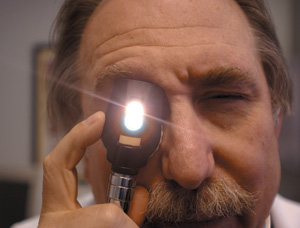 Physician/musician
Mitchell Kahn, AB’71, keeps performing artists healthy so
the show can go on. For Kahn, his job beats taking the stage.
Physician/musician
Mitchell Kahn, AB’71, keeps performing artists healthy so
the show can go on. For Kahn, his job beats taking the stage.